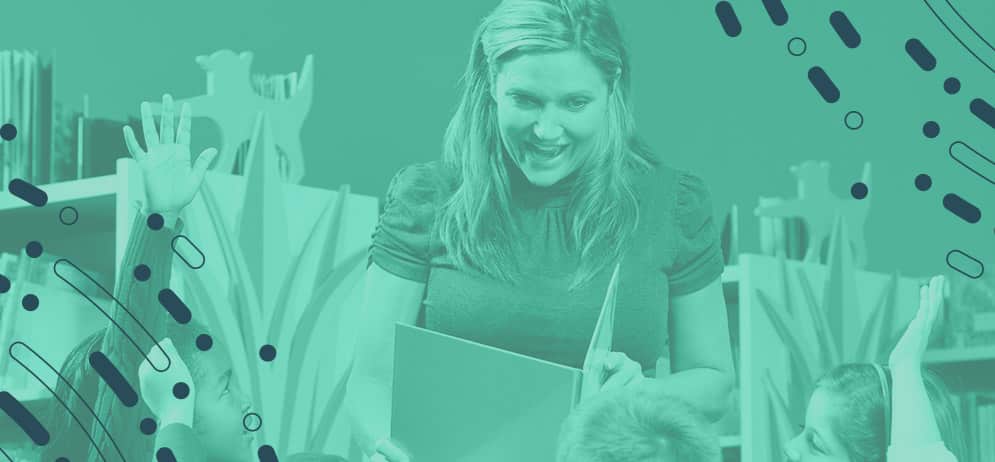Each day, nearly 12,000 students walk into classrooms at Jenks Public Schools. Sitting just south of Tulsa, Oklahoma, the district places a strong emphasis on academic performance — a focus that stems from serving students for more than a century.
“At the classroom level, at the district level, we really want to understand our past, we really want to understand our present, and then we always want to push ahead,” said Mary Kathryn Moeller, Director of Professional Development at JPS.
Professional learning at Jenks Public Schools: “We really want to understand our past, we really want to understand our future, and then we always want to push ahead.” @jenksps http://bit.ly/2DpH0HR
In December, we spoke with Mary Kathryn about the professional learning program at JPS. (You can hear the interview above, or subscribe to our podcast on iTunes.) Her team’s desire to innovate while building on the decades of work at Jenks Public Schools was evident. We asked Mary Kathryn: What questions do you and your team ask when considering new professional learning opportunities?
Here are the 6 questions she shared:
1. What’s the purpose of this professional learning opportunity?
“One of our immediate questions, if something is new, would be about the ‘why’ of it… We start with what is our basis of need? What identified need has come up? What is the point of interest? Is there emerging research we’re trying to stay abreast of?” said Mary Kathryn.
That basis of need might also stem from student data, such as work samples or test scores. Their aim is to purposefully work toward a desired result, and not simply provide workshops for the sake of checking off boxes.
2. Will it overlay our existing practices? Or will it require us to abandon what we’ve already done?
“We always want to be faithful to the work that our teachers are doing and the work that exists. That’s one of the major things we look at.”
3. Will it open new opportunities for our students?
“We always want to honor our past, but we always want to be looking ahead, especially in the age we live in now. We’re preparing our students for jobs that may or may not actually exist at this given moment. We’re always looking to the future, but [not for the sake of simply] trying the latest and greatest thing or going off in an unusual direction.”
4. Where did the idea come from?
“We also really look at the source of it. Is this a speaker, a researcher, someone who is in the work and doing it? Someone who is out there speaking and sharing with teachers? Is it someone who really understands the many things that go on in a classroom?”
5. How will we implement this?
“We look at fidelity of implementation, which is always a question, always making sure that we’re talking about equitable distribution of the information and of the support that teachers need to implement.”
When implementing a new practice or strategy, the team works in an iterative cycle. “Next steps, more learning, implementation, data points, next steps, professional learning, implementation, data.” They’ll stay in this cycle until they see a new need or opportunity.
6 questions to ask when exploring new professional learning opportunities: http://bit.ly/2DpH0HR
6. How will we collect data around this?
Mary Kathryn and her team highly value data. It takes different forms: perception surveys from participants, observations to see how learning is implemented in the classroom, student academic data, and even empathy research, because learning is such a personal experience.
“Asking questions about how people feel… ‘What are some of the things you hear, feel, think and see?’ That’s an odd data point because it’s not terribly formal, but when you ask those questions in the right way, you get some real personal responses in a way you might not get from a more formal type of survey.”
The team at Jenks works hard to collect multiple perspectives on professional learning, too. “Our baseline…is always collecting data or feedback from lots of different voices, trying to hear from everybody that this might impact. In May, we hold a visioning meeting around professional learning for the next year. We always invite parents to that as well, which may seem odd, but in fact, having the parents as part of that conversation is really valuable, because they know what’s going on in the classroom as they work with their own child. In the end, we’re all working together for the benefit of the students, so the parents are an essential part of that.”
When planning a new professional learning initiative, identifying how to collect data provides a map to help the team identify next steps to take: “How did that go? What could we do better? What do we need to change?”
Mary Kathryn and the rest of the team at Jenks Public Schools work hard to be intentional when introducing new initiatives. They don’t shy away from taking risks and exploring innovation — but they want to be wise about it.
“That’s really been our process… because our teachers are very busy and they’re pulled in lots of directions. We want to be really intentional before we introduce something new or ask them to make a shift or a change.”
Looking for a better way to support teacher growth through professional learning and an evaluation process focused on improving practice? Want to take the next step toward educator effectiveness? Find out why so many districts use Frontline Professional Growth.
